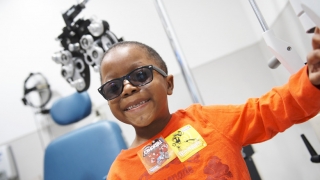Vision Screenings for Kids: Should Your Child See an Eye Doctor?
Published on
Health Tip of the WeekPublished on
Health Tip of the Week The importance of good eyesight should never be underestimated — especially in school-age children.
The importance of good eyesight should never be underestimated — especially in school-age children.
“Much of what a child learns in school is information that is presented visually,” says CHOP pediatric optometrist Ayesha Malik, OD, who sees patients at CHOP’s Main Campus, as well as the King of Prussia and Brandywine Valley Specialty Care & Surgery locations. “That’s why good vision is essential for students of all ages to reach their full academic potential.”
Plus, if vision disorders are left undetected, they can lead to vision impairments that stay with your child into adulthood — and possibly vision loss. When undiagnosed and untreated in infancy or early childhood, conditions like amblyopia (also referred to as lazy eye) can result in reduced vision in one or both eyes due to poor development of vision.
The best way to detect vision problems is through vision screenings, either at school or by your child’s pediatrician.
Vision screening is most effective when performed periodically throughout childhood. The earlier a problem is detected, the better the chance your child has to obtain maximal vision through appropriate treatment.
Your child’s healthcare team should perform age-appropriate vision screenings throughout infancy and childhood. If your pediatrician doesn’t, ask for one, suggests Dr. Malik. “Advocate for your child because these regular screenings are very important.”
There are also some signs that may indicate your child has a vision problem. These include, but are not limited to:
If you notice any of these signs, or your child fails a routine vision screening, you should make an appointment with an eye doctor for a comprehensive eye examination. Other reasons your child may need a comprehensive eye exam include a family history of pediatric eye disease or other known risk factors for eye disease.
A comprehensive eye exam is designed to determine not only if your child will benefit from glasses or other vision treatments, but also to examine your child's overall visual development. These exams include a dilated eye exam and a check of the eyes’ overall health.
Dr. Malik says it’s important not to put off a comprehensive eye exam if your child needs one. The earlier vision problems are detected the better. “Childhood is a sensitive period of time for eye development and if a vision problem is suspected, timely intervention can ensure healthy growth and development of the eye and visual system.”
Contributed by: Ayesha Malik, OD
Are you looking for advice to keep your child healthy and happy? Do you have questions about common childhood illnesses and injuries? Subscribe to our Health Tips newsletter to receive health and wellness tips from the pediatric experts at Children's Hospital of Philadelphia, straight to your inbox. Read some recent tips.